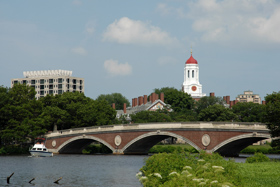Harvard University restricts travel to Ebola-stricken countries

Harvard University. Image from Shutterstock.
Amidst international debate over whether travel to and from countries ravaged by the deadly Ebola virus should be banned or restricted, a major American university has imposed its own standards.
Travel on official Harvard University business now requires permission from the provost and the dean of the school with which the individual is affiliated. And those returning from the three West African countries hit hardest by the disease—whether there for university or personal reasons—must undergo a medical screening and face a potential 21-day quarantine, according to the Harvard Crimson.
In August, faculty, students and staff were asked to refrain from nonessential travel to the three countries, Guinea, Liberia and Sierra Leone.
The new guidelines emailed Friday to those in the Harvard community offer more detailed instructions.
“In times like this, we all feel compelled to do something. But for our good intentions to produce positive outcomes, we must find the safest and most appropriate ways to help,” the document states. “The Ebola outbreak has devastated the already-limited health systems and public infrastructure in Guinea, Liberia, and Sierra Leone. To contribute effectively in-country entails great personal risk and requires complex logistical support, which only a few aid organizations and governments are capable of providing. Only clinicians with the highest level of readiness—personal, mental, and professional—should even consider traveling.”
It also warns community members that few resources may be available to help them if they are stricken abroad.
Hat tip: Daily Mail.



